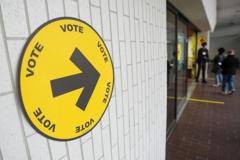Canadians are casting ballots in a crucial election reshaped by President Trump’s policies and comments, impacting party dynamics and voter sentiment.
Canada's Election Heightened by US Political Climate

Canada's Election Heightened by US Political Climate
Voters head to polls in Canada as US relations, influenced by Trump, change the political landscape.
Canadians are set to participate in a critical election on Monday, with increasing tensions from south of the border strongly influencing their political landscape. Initially thought to be a straightforward win for the Conservatives, the election dynamic shifted unexpectedly due to US President Donald Trump’s controversial tariffs and provocative remarks suggesting Canada could become the "51st state".
The latest polls indicate a narrow lead for Mark Carney's Liberal Party, which has seen a resurgence largely attributed to the frustrations stemming from Trump's antagonistic stance. Conservative leader Pierre Poilievre, however, remains optimistic, asserting that his party can secure victory despite a tightening race in recent weeks.
The 36-day campaign concluded on a grim note following a tragic car ramming incident in Vancouver that claimed 11 lives. In response, both Carney, the current Prime Minister, and Poilievre made adjustments to their campaign schedules, with Carney opting to address the nation after the attack and Poilievre engaging with the Filipino community in Mississauga.
Trump's administration has ignited a wave of Canadian nationalism, resulting in public displays, such as hockey fans booing the US national anthem. During campaign events, Carney characterized Trump’s actions as a threat to Canadian sovereignty, indicating that Canadians need to strengthen alliances with nations like the UK and the EU.
Meanwhile, Poilievre has positioned himself as the candidate for those yearning for change, frequently referencing the struggles and economic hardships experienced during the Liberals' governance. His campaign has centered on issues such as soaring living costs and crime rates, rallying support from citizens eager for a shift in leadership.
In the midst of a two-horse race between the Conservatives and Liberals, smaller parties like the NDP and Bloc Québécois are struggling to make an impact. NDP leader Jagmeet Singh, who experienced emotional moments during the tragedy in Vancouver, urged Canadians to vote for his party as a means to create a balance of power in government.
The election's outcome could be swayed by public sentiment regarding Trump's administration, even as he refrained from commenting directly on the Canadian election. As polls open, an unprecedented number of more than 7 million Canadians have already participated in advance voting, illustrating the heightened engagement of the electorate amid intense national apprehension.
With the election spanning multiple time zones, results will come in throughout the day as Canadians turn out to determine their political future amid these crucial global interactions.





















